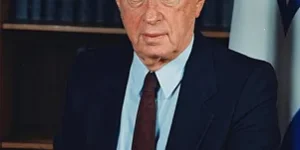Rabin’s life remains an example of Zionist courage and vision, and his death a warning of the depths to which our internal divisions can still drive us.
It is difficult to believe that thirty years have passed since that dreadful night of Yitzhak Rabin’s assassination. Yet his life remains an example of Zionist courage and vision, and his death a warning of the depths to which our internal divisions can still drive us. We must strive to emulate him and we must always remember.
My first time meeting Rabin came at a pivotal moment for me, a teenager at the start of my Zionist journey. I wrote about the importance of that interaction in my memoir, Ally.
As you’ll read in the excerpt below, meeting Rabin changed my life.
Ally: My Journey Across the American-Israeli Divide (excerpt)
Random House, 2015
We sang at the top of our teenaged voices, Heveinu Shalom Aleichem—we welcome you in peace—and clapped until our hands grew numb. I could scarcely believe that I was seeing him. Here, only yards in front of me, stood the hero of the 1967 Six-Day War, the former commander of the Israeli forces who rescued Jewish dignity from the pall of the Holocaust, who enabled us—so American Jews claimed—to stand with our backs straight. And now he addressed us as Israel’s ambassador to the United States, the representative of the reborn Jewish State to the world’s greatest power.
He spoke only for a few minutes and concluded with a reticent smile. He then stepped off the improvised dais so that the guards could hurry him back through the doors. As he passed me, I managed to extend my hand. He accepted it—shyly, eyes looking down—and gave me a perfunctory shake. But that was enough. Silently, I vowed, “That is what I’ll be someday—Israel’s ambassador to America.”
His name was Yitzhak Rabin. And his life remained a model for mine. Following his example, I would devote myself to Israel, fight in its wars, and defend it from critics. I shared his vision of peace in spite of disappointments and bloodshed. Years later, together with countless candle-holding mourners, I filed past Rabin’s casket. Though I never had the opportunity to tell him about the impact he had on me, I never forgot that encounter in the basement. Or the pledge I made to myself.







